I keep thinking about the life Halley McCarthy left behind in San Francisco.
Not the glittering skyline at night, not the noise and the pace that never seemed to let her breathe, not even the people she walked away from. What stays with me is the version of herself she built there: the sharp edges, the endless hustle, the stubborn belief that if she worked hard enough, if she sacrificed enough, she could outrun all the old ghosts still clinging to her.
In Michelle Morris’s Comes Around, Halley isn’t returning home to Michigan because she wants to. She’s returning because she doesn’t know where else to go. The life she worked so hard to create has collapsed in on itself, and she’s left hollowed out, ashamed, heartbroken, and unsure if there’s even enough of her left to rebuild.
And the thing is, Morris doesn’t give us a front-row seat to the implosion. She doesn’t drag us through boardrooms or breakups or headline scandals. Instead, she writes the aftermath. The quiet wreckage. The way grief settles into your bones when you’ve lost not just people, but the very sense of who you are.
I know something about that kind of grief.
Years ago, in my twenties, I threw myself into a life I thought I wanted. Long hours. Big projects. All of it was designed to prove something, to myself, to the world, to anyone who had ever doubted me. And for a while, it worked. From the outside, my life looked shiny. Successful. But there’s a cost to holding yourself together so tightly for so long. Eventually, the cracks begin to show.
I remember walking home one night after a long day at work. The lights in the city were pretty, and I couldn’t feel anything. I wasn’t really sad. I wasn’t mad either. I was just out of it. It scared me.
When Halley flees San Francisco, she’s carrying that same numbness. That’s what makes her story so quietly devastating. She doesn’t arrive in Michigan like a woman running toward hope. She arrives like someone stepping out of the wreckage, unsure if she deserves another chance.
Home is complicated for Halley. Her father, Irish McCarthy, is an imposing figure, a biker club president with a reputation as unshakable as his silence. Their relationship is knotted with years of absence and pride, love and hurt. And then there’s Priss, her stepmother, whose elegance and sharpness have always made her seem untouchable.
Her siblings don’t quite know what to make of her either. She’s the sister who left, the one who built a life far away, the one who’s back now with guarded eyes and too much history trailing behind her.
But what I love most about Comes Around is that Morris doesn’t treat these relationships like puzzles to be solved. There are no grand speeches that untangle decades of hurt. Healing happens here in fragments, in a plate of food left waiting on the counter, in a blanket pulled over Halley as she sleeps, in the tentative way her little sister Scarlett leans into her side at the dinner table.
There’s a low hum of danger in this book, too; someone from Halley’s past hasn’t let her go. There is also a low hum of danger in this book because someone from Halley’s past won’t let her go. That dark figure makes things more tense, but it never takes away from the story’s emotional core. Halley isn’t really in danger out there somewhere. When she’s alone and quiet, going through the pieces of her old life and wondering if she can be someone new, that’s when it happens.
And that’s what hit me hardest while reading: how difficult it is to forgive yourself for becoming someone you never meant to be.
I thought about my own San Francisco, the metaphorical one. The place where I once built a life that looked good from the outside but felt all wrong on the inside.
When I finally walked away, I didn’t feel strong. I felt small. I felt like a failure. And even now, years later, I still have moments when that old voice whispers, You could have done more. You could have been better.
But maybe that’s why Halley’s story mattered so much to me. She isn’t perfect. She doesn’t have all the answers. And yet she’s trying, tentatively, clumsily, to choose something softer.
Comes Around isn’t a loud book. It doesn’t try to wow you with plot twists or fancy writing. It’s quiet in a way that feels almost holy, like being with a friend who just listens and doesn’t try to fix you.
It made me remember that big gestures don’t build real, lasting trust. It grows in small, steady steps. The ones where you let someone see you at your most vulnerable, and they decide to stay.
And sometimes, that “someone” has to be yourself.
By the time I closed the book, the world outside my window had gone still. The air felt heavier somehow, but not in a bad way. More like something was shifting inside me, a loosening, maybe.
Comes Around doesn’t ask you to erase your past. It doesn’t offer easy redemption or tidy resolutions. It just reminds you, in its quiet, tender way, that even after the worst has happened, there is still a way forward.
Even after all the breaking, there is still a way home.


